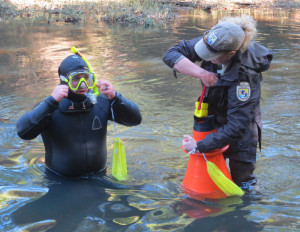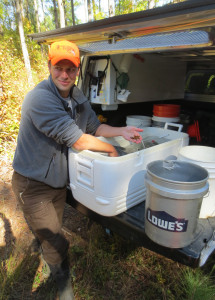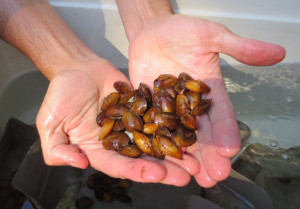Endangered Mussels Released in Fishing Creek
Thanks to a collaboration of several conservation agencies, the population of the endangered Tar River Spinymussel is growing in Fishing Creek and Little Fishing Creek in Nash and Halifax Counties, North Carolina. The partners – the US Fish & Wildlife Service (USFWS), the NC Wildlife Resources Commission (NCWRC), and NC State University’s College of Veterinary Medicine – have released over 8,500 individual Tar River Spinymussels into these creeks since December 2014. The mussels were bred and raised at the NC State’s Aquatic Epidemiology and Conservation Laboratory and the NCWRC’s Marion Conservation Aquaculture Center over the past five years.
 “The release of captive-raised Tar River Spinymussels into Fishing Creek is a critical step in preventing the species’ extinction and recovering healthy wild populations,” stated Sarah McRae, USFWS aquatic biologist. “This mussel was once prevalent in many streams in the upper Tar River Basin, but its numbers have declined considerably over the decades. The surviving wild populations of the Tar River Spinymussel are small to extremely small in size.” The captive-raised mussels will significantly increase the population in Fishing Creek and Little Fishing Creek, giving the species the chance to breed and expand in its native habitat.
“The release of captive-raised Tar River Spinymussels into Fishing Creek is a critical step in preventing the species’ extinction and recovering healthy wild populations,” stated Sarah McRae, USFWS aquatic biologist. “This mussel was once prevalent in many streams in the upper Tar River Basin, but its numbers have declined considerably over the decades. The surviving wild populations of the Tar River Spinymussel are small to extremely small in size.” The captive-raised mussels will significantly increase the population in Fishing Creek and Little Fishing Creek, giving the species the chance to breed and expand in its native habitat.
 The Tar River Spinymussel – also known by its scientific name Elliptio steinstansana – is one of only three freshwater mussels with spines in the world. The species was added to the federal list of endangered species in 1985. Based on best available data, populations of Tar River Spinymussels declined as habitat was impacted by silt, polluted runoff, and wastewater discharges. Tar River Spinymussels and other freshwater mussels play important roles in keeping streams healthy. Mussels are natural filters in the environment. They siphon water to feed on algae, plankton, and silts – helping purify the water they inhabit. Freshwater mussels are also an important food source for many species of wildlife including otters, raccoon, muskrat, herons, egrets, and some fish.
The Tar River Spinymussel – also known by its scientific name Elliptio steinstansana – is one of only three freshwater mussels with spines in the world. The species was added to the federal list of endangered species in 1985. Based on best available data, populations of Tar River Spinymussels declined as habitat was impacted by silt, polluted runoff, and wastewater discharges. Tar River Spinymussels and other freshwater mussels play important roles in keeping streams healthy. Mussels are natural filters in the environment. They siphon water to feed on algae, plankton, and silts – helping purify the water they inhabit. Freshwater mussels are also an important food source for many species of wildlife including otters, raccoon, muskrat, herons, egrets, and some fish.
The locations of the Tar River Spinymussel releases were carefully selected by NCWRC biologists based on historic collection localities, favorable stream conditions, and approval from neighboring landowners. Locations include several properties along the creek owned by the Tar River Land Conservancy (TRLC) and privately-owned farms protected with conservation easements.
“Since 2000, our group has preserved and acquired over 1,900 acres of wetlands and woodland along Fishing Creek and Little Fishing Creek,” noted Derek Halberg, TRLC Executive Director. “This watershed has the best remaining habitat available for the Tar River Spinymussel. We hope to preserve more of the forested properties that buffer these creeks to give the mussels time to breed and recover.”
 The Tar River Spinymussels grown in captivity were raised in tanks at the Marion Conservation Aquaculture Center for an average of three years before release into Fishing Creek. “Before we release mussels into the wild, we laser etch unique identification numbers into the shell or attach glue-on tags to the shell,” said Dr. Tyler Black, NCWRC aquatic biologist. “We also measure the shell length of the mussels and record their release location using GPS. After release, we will monitor the release locations through time to see how many mussels survive and hopefully document increased wild reproduction.”
The Tar River Spinymussels grown in captivity were raised in tanks at the Marion Conservation Aquaculture Center for an average of three years before release into Fishing Creek. “Before we release mussels into the wild, we laser etch unique identification numbers into the shell or attach glue-on tags to the shell,” said Dr. Tyler Black, NCWRC aquatic biologist. “We also measure the shell length of the mussels and record their release location using GPS. After release, we will monitor the release locations through time to see how many mussels survive and hopefully document increased wild reproduction.”
More releases of the Tar River Spinymussel are planned in Fishing Creek and Little Fishing Creek in the future. Future releases are expected to include other captive-raised endangered mussels historically found in the Tar River Basin, including the Atlantic Pigtoe (Fusconaia masoni) and Yellow Lance (Elliptio lanceolata).
To watch a video produced by the USFWS about this project, please visit www.youtube.com and search for “recovering the Tar River Spinymussel” or click here. Please visit www.fws.gov/raleigh/species/es_tar_spinymussel.html to learn more about the endangered Tar River Spinymussel.



